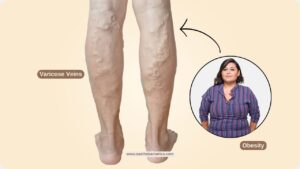What Is the Link Between Lymphedema and Obesity?

Obesity can lead to several health conditions, ranging from diabetes and high blood pressure to heart disease and stroke. It might not be a surprise to you that lymphedema and obesity are also linked, both in terms of your risk of developing lymphedema and the severity of your symptoms. Managing your weight is a crucial step in preventing lymphedema and other medical conditions that obesity may exacerbate.
What is lymphedema?
Lymphedema is a medical condition characterized by the improper function of your lymphatic system. The lymphatic system is responsible for maintaining fluid levels in our body tissues by removing all fluids that leak out of our blood vessels.
The lymphatics also function to transport fat, protein, and other nutrients, as well as prevent infections. This is all accomplished as a result of lymph fluid moving throughout your lymphatic system, through a series of lymph vessels, in addition to being filtered through lymph nodes, and eventually draining through one of the main lymphatic ducts, where it re enters the bloodstream again. Finally, the lymph fluid is drained through one of the main ducts, where it enters the bloodstream again.
In patients with lymphedema, lymph fluid builds up due to a problem with lymphatic drainage. This can be caused by a damaged lymph vessel, a blocked or removed lymph node, or any other drainage-related problem with your lymphatic system.
As this lymph fluid continues to build up in the tissues, it can potentially cause visible swelling, pain, itching, and other symptoms, including skin changes and an increased risk of infections. Common causes of lymphedema include cancer, particularly breast cancer, cancer-related surgery, radiation, chronic venous disease, direct trauma, and obesity.
What is Obesity?
Obesity is an excessive accumulation of fat that presents a health risk. A person is classified as overweight if they have a body mass index (BMI) of at least 25, while a person is obese if they have a BMI of at least 30.1 Common causes of obesity can include a poor diet, a lack of exercise, genetics, or a combination of these factors.
The biggest concern with obesity is that it can put you at risk for several medical conditions and complications. For example, people who are obese are more likely to experience high blood pressure and heart disease, which can lead to heart attacks and strokes. Excess fat may result in your circulatory system working harder to circulate blood, while your lymphatic system has to work harder to move and drain lymphatic fluid.
If someone falls into the overweight or obese BMI range, one should talk to the doctor about losing weight and maintaining a healthy weight.
Lymphedema is a condition that occurs due to a blockage or damage to the lymphatic system. The lymphatic system allows a fluid called lymph to circulate through the body via a network of vessels. It is a part of the immune system and is vital in fighting disease.
Several factors might lead to the development of lymphedema. A prominent risk factor is obesity.
Obesity is closely linked to lymphedema since it can alter lymphatic functioning. Obesity can cause inflammation in the lymphatic system. This reduces the flow of lymph through the vessels and can cause the lymphatic vessels to leak. This can lead to lymphatic dysfunction and, ultimately, lymphedema.
Obesity-induced lymphedema can develop in the lower part of the body if an individual has a BMI that exceeds 50 and in the upper parts of the body if the BMI exceeds 70.
Lymphedema in people with obesity can significantly affect their quality of life.
WHAT ARE SYMPTOMS OF LYMPHEDEMA THAT OBESE PATIENTS SHOULD LOOK OUT FOR?
If you’re obese, you may experience more severe lymphedema or lymphedema that occurs without a secondary cause, such as an injury or surgery. For these patients, weight management is an important part of keeping lymphedema symptoms in check and preventing complications. This also means that you need to keep an eye out for lymphedema symptoms if you’re obese. Here are the symptoms to be aware of if you’re obese and are worried about developing lymphedema.
Pain: A buildup of lymph fluid in the fatty tissues in your body can lead to pain, although this pain may not always present. Pain as a result of lymphedema is more likely when severe swelling is present.
Swelling: Swelling in lymphedema patients occurs from the buildup of lymph fluid in the fatty tissues underneath the skin. This swelling may result in pain. Swelling that is caused from lymphedema can also make it difficult to fit into your clothes, which means you may need to switch to something looser when swelling progresses. Compression garments, elevation, regular exercise, and hydration can help promote the flow of lymph fluid and reduce swelling.
Decreased range of motion: Depending on the severity of your lymphedema, the swelling may eventually get to a point where it affects your range of motion. You might experience pain and tightness in your legs when you walk, or you may feel discomfort when you lift your arm above your head or stretch it out to reach for something. This decreased range of motion usually goes away when the swelling goes down. Because obesity can already make it more difficult to move around and live a pain-free life, lymphedema combined with obesity can make things significantly more challenging.
Hardened skin/fibrosis: In very severe cases of lymphedema, the skin may begin to harden and take on the look and feel of a tough animal hide, such as an elephant. Hardening of the skin is also called fibrosis. You may also notice your skin changing from its regular colour to a brownish colour. In some cases, patients with hardened skin also have small bumps on their skin called papillomas, which can leak fluid.
Limb heaviness: Like other types of edema, lymphedema can make your limbs feel heavy. This is largely a result of the swelling in the limbs, but it’s compounded for obese patients who may already have a tough time moving around comfortably. You may also experience a sort of “tight” feeling in the skin, which might get worse when you stretch your legs to climb stairs or stand up.
Numbness: While pain and discomfort are somewhat common with lymphedema, sometimes you won’t feel anything at all. Numbness and tingling are common sensations for lymphedema patients, although these symptoms may not last for extended periods of time.
Treating obesity-related lymphedema
The initial treatment of obesity-related lymphedema is similar to the traditional lymphedema treatment methods. Doctors recommend compression garments and pneumatic compression to help the fluid move out of the affected area and prevent its accumulation.
People with obesity-related lymphedema need to carry out exercises as a part of their treatment since it will help them to lower their BMI and help transport the lymphatic fluid.
Surgical procedures, such as excisional procedures, can sometimes help lymphedema.
Doctors often recommend people with obesity-related lymphedema visit a bariatric weight loss centre for surgical weight loss. This is because many people with obesity may find it difficult to lose weight through diet and exercise alone.
Following weight loss, doctors may remove redundant skin and a small area of localised lymphedema. This helps to lower the risk of complications and recurrence.
Read also; The Cost of Bariatric Surgery in India
Why We Are?
- Asia's Trusted Bariatric Center
- Centre of Excellence
- Patient Trusted Highly Volume Bariatric Center in Mumbai
- EMI, Cashless & Mediclaim Facilities are Available
- Daily Patients Follow-up after Bariatric Surgery
- Patient Support Group Every Month
- Obesity Awareness Program
- Available with Latest Technologies
- 18+ Experience in Weight Loss Bariatric Surgery
- 300+ Weight Loss Diet Plan & Recipes
- Highly Trained & Experienced Bariatric Nutritionist
- Patient WhatsApp Chat Group
- & Many More
Medically reviewed by Dr. Manish Motwani, Bariatric & Metabolic Laparoscopic Bariatric Surgeon — Curated by Akansha Mishra








